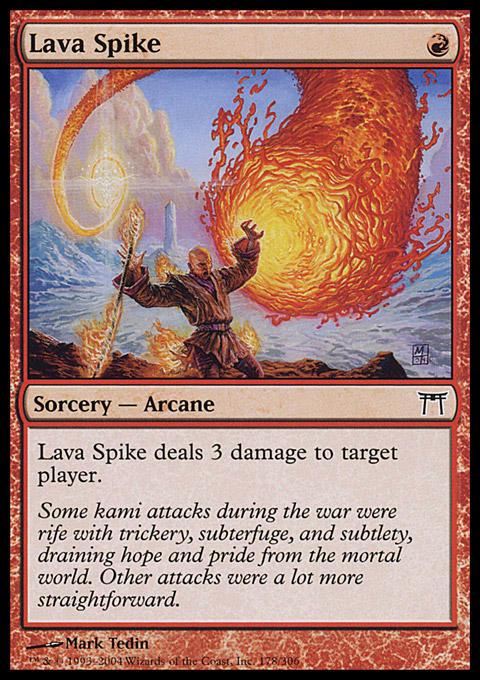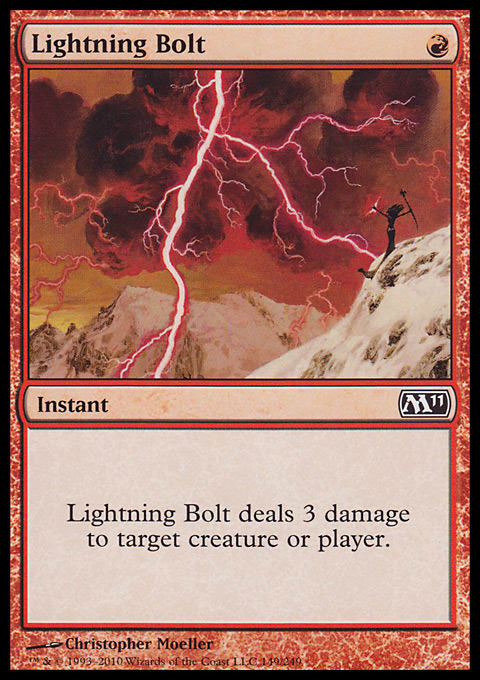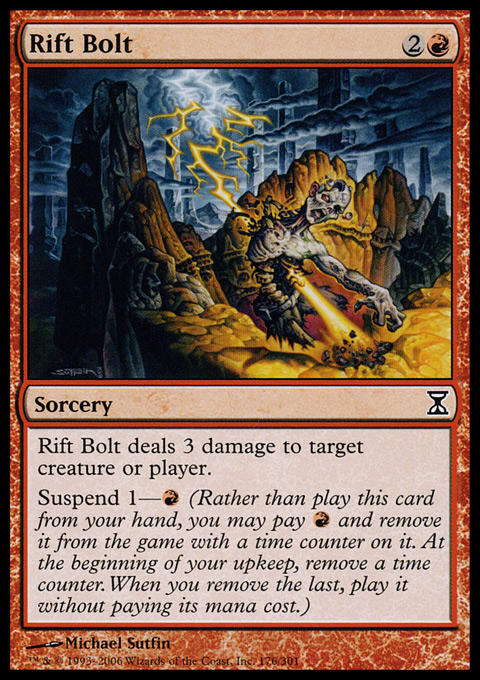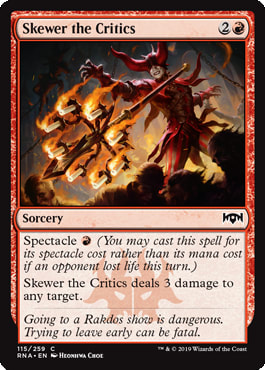I saw a Tweet over the weekend that rustled a couple of feathers:
Why are Tron players the way that they are?
— Magic Esports (@MagicEsports) February 26, 2021
Obviously, this was intended to be a joke. But it did actually get me thinking. There are a number of linked assumptions inherent in even asking the question.
- There is such a noun as a Tron player
- Those players have some unspoken characteristics in common (by implication undesirable)
- There are some human Magic: The Gathering players who identify as Tron players, are possessed of the aforementioned characteristics, and take this on as an identity
How do I think about Tron players?
Personally, I've never had a beef with them. They are kind of in the opposite quadrant from me, but I don't think they're bad people or anything. As a Burn Player [more on that in a moment!], I have always supposed to have been wolf to their sheep... But it's never really played out that way for me... At least not when it mattered. The only time I ever faced Tron in a Top 8 he had natural Tron on the third turn two of the three games and drew both Wurmcoil Engine and All is Dust. It's not just that that's completely random, those boom booms aren't very good a decent percentage of the time. My Burn-apprentice Roman Fusco once said he had a 100% win rate against Tron except in matches where it mattered.
Fundamentally, Tron players are like Syltherin. They revel in power.
But - perhaps still like Slytherin, or maybe just American - they seem rather entitled. Who plays sevens? Who plays a full set of sevens and a full set of sixes and plans to play multiple turns of Magic: The Gathering with them all in play? I can totally understand the perspective of someone who plans to cast one six and win the game with it... But actually attacking for six four times? In Modern? These are people who believe in their cores that things are going to go right for them and they have a right to play the game on their terms, kind of without a vote from their opponent.
This, of course, seems looney toons to me! Not because I'm supposed to be predator to their prey... But because there are so many folks out there who can outright win before they get in a single swing with their Wurmcoil Engine.
"I hope you like my third-turn Karn," says the Tron player. But Karn isn't even good like half the time!
Then I realized: Tron players are all optimists. They're dreamers. They're the John Lennon of the Modern metagame. Isn't that wonderful?
So, I intimated a couple of times that I'm a Burn player in Modern.
If you've only been reading me here on CoolStuffInc, you probably just think of me as a Burn player. I certainly joke about being one enough.
But do you know when I became a Burn player?
August 2016.
Got there! #pptq winner / #rptq Dublin here I come ? Thanks @BasicMountain pic.twitter.com/7DeX8wd31Y
— Michael Flores (@fivewithflores) August 7, 2016
Identity, Secret Identity, Secret Origin
Here's my secret origin of becoming a Burn player in Modern.
Please keep in mind that by December of 2019, right before the world blew up, I had back-to-backed Modern Invitational qualifiers (with my trusty Monastery Swiftspears) and Modern had become my favorite format to play. In February 2020, the last four tournaments I played (including the last physical Pro Tour, a Grand Prix I cashed at, and an FNM I won) were with Pioneer Burn, playing many of the same [physical] cards.
But prior to August of 2016, I had only ever played a single Modern event. One! And I went something like 1-2 with Grixis Control.
What happened that summer?
It just so happened that my kids visiting their grandparents for the week coincided with a double PPTQ weekend in New York City. I didn't realize very far ahead of time so I just threw together a deck with cards I had lying around. Remember - I had almost never played Modern at all before!
I owned Scalding Tarn from a Standard Izzet combo deck, and all the Shock lands from the original Ravnica block. I had won States in 2006 with Lightning Helix but embarrassingly, my Lightning Bolts were somehow of the 2010 vintage. Most of the rest of the Staples were from my infrequent visits to Legacy, under the tutelage of Patrick Sullivan.
I didn't win the Saturday PTQ, but ended up feeling pretty good.
Sunday I got almost easily.
Roman was playing Scapeshift but didn't do well. I told him to play my Burn deck with no Wild Nacatls (which, in truth, was at least somewhat because I didn't own Wild Nacatls), and he won the next PPTQ.
Suddenly I had a Burn buddy.
But I had kind of fallen into it.
In more than two decades of playing Magic, nothing had ever felt so natural. Effortless in victory. Rewarding in struggle.
Surely this had become my identity as a Magic player.
Did I have previous identities? I have no idea how many PTQs (or the equivalent) that I've won with ![]()
![]() decks, but it's more than two. Nor Black beatdown decks (but it's more than three). I literally put my teammate Sol Malka's deck The Rock on the map, not only winning the first ever Extended PTQ with it; but beating Mike Pustilnik with it so that he switched and won Grand Prix Las Vegas the same weekend. I literally invented
decks, but it's more than two. Nor Black beatdown decks (but it's more than three). I literally put my teammate Sol Malka's deck The Rock on the map, not only winning the first ever Extended PTQ with it; but beating Mike Pustilnik with it so that he switched and won Grand Prix Las Vegas the same weekend. I literally invented ![]()
![]() Splinter Twin but, at the height of Caw-Blade, had to be convinced to play it at the last minute! None of those were my identity.
Splinter Twin but, at the height of Caw-Blade, had to be convinced to play it at the last minute! None of those were my identity.
For the longest stretch - more than ten years - I was convinced that the magic of Magic was in deck-building. Deck-building was the art by which I could express myself in my hobby.
But Magic has obviously changed in these last few years. Relatively few new decks are built, rather than being discovered by the Hive Mind. Anything worth its salt is just absorbed into the metagame; everything else discarded. I had to find a different way to express myself in my hobby.
The Tweet asks why Tron players are the way they are.
I'd like to answer why this Burn player, at least, is the way he is. To me there are four main drivers:
- Constant Opportunities for Innovation
- Defiance of Expectation
- Flexibility in Plan
- Plan A
Constant Opportunities for Innovation
Around the time of The Chained to the Rocks Experiment (still my favorite article I've ever written for this site - you should check it out), I was laughing with Roman about "our" deck. We were negotiating about how many Kor Firewalkers we would play; which were really just there to hate each other out.
Roman and I had only a week earlier recorded How to Think About Magic and were torn over one of that article's core principles: No Long-Term Alliances or Allegiances. Was the fact that we "liked" Burn clouding our deck choice decisions?
Roman actually had the best answer.
No.
We weren't stagnant. We weren't "loyal" turn Burn. Rather, Burn was - for me especially - a playground for innovation.
Look at the changes we drove that eventually became stock in all Modern Burn decks:
- No Wild Nacatls
- Going down to one Stomping Ground, then eventually zero
- Inspiring Vantage as a Staple
Can you imagine that the first time I played Inspiring Vantage in the Utah RPTQ I actually got heckled by a Grand Prix Champion?
There are the ones that were less popular, but still really great technology, and more importantly, meaningful to me:
If the world hadn't blown up, I bet that last pair would have had their names in lights.
Maybe I didn't have the ability to snap my fingers and make a Napster or a Naya Lightsaber in such a different Magic environment, but I could work with something that seemed stock and customize it... Really make it better. Or at least make it do what I wanted it to do. Which leads me to:
Defiance of Expectation
Roman was the first person who pointed out to me that Affinity was a bye.
I had gotten into an argument with some of my Movie Klub friends (both Grand Prix Top 8 competitors) who claimed the MTGGoldfish data was overwhelmingly conclusive: Affinity had the edge over Burn in Modern.
I just assumed this was true.
But Roman was so casually successful in his Affinity matches. When I got paired against them, I kept winning, too; sometimes in two. Never came close to losing a sideboard game.
Our game plan had no strategic flaws. Our whole deck was Grim Lavamancers and some combination of Searing Bloods, Searing Blazes, and Smash to Smithereens after sideboarding. Path to Exile and Chained to the Rocks for their remaining big guys. We removed Eidolon of the Great Revel and any burn spell that couldn't be pointed at a creature. They could pick their starting seven and never come close to winning.
Affinity, for all its explosive power, functions as a StOmPy deck. It wins by attacking. Neutralize its attackers and you win by default. Two Goblin Guide points ten times will do it, in part because they'll never have a blocker.
The same broad classes of sideboard cards were extensible to the then-more popular Infect and rising Humans decks. Smash to Smithereens - or even Kataki, War's Wage in some versions - had text against Inkmoth Nexus, Spellskite, or as Aether Vial tax.
Winning these matches was so g-d satisfying.
The first few times the Affinity opponents were visibly upset at losing. "I can't believe I lost to Burn" more than one would say. When I made Top 8 of Modern Regionals, I beat the Humans player who had won the first big event with that deck the week before. I'm sure he thought he had a good matchup, too.
How could their expectation be so distant from reality?
I think it's the same as the Death's Shadow folks.
Full disclosure: I eventually lost a match to Death's Shadow. But it took something like two years. In all my Modern play I've only lost to that deck twice, and both of them were due to brief but fatal lapses in concentration on my part, and both with the Black splash version.
Death's Shadow players - the ones who are convinced they have a good matchup with Burn - see Burn players as helping their strategy along by making Death's Shadow bigger.
But we just didn't approach it that way. If you don't do anything, Death's Shadow can't even hit the battlefield. They have to damage themselves before it gains text. You can just save all your firepower for one turn. And rather than dealing 20, you can win by dealing less than 13! It's an excruciatingly simple strategy once you know it. Their cards are very powerful, and sometimes they have a Gurmag Angler. You have to respect that in the same way you would respect a Tarmogoyf. Which is still far slower than your Plan A.
That's because Burn is invincible, right?
No.
It's customizable.
In order to make your deck really good against Affinity, Infect, Humans, and Death's Shadow you have to give up cards like Tormod's Crypt, Rest in Peace, or Shrine of Burning Rage. You know, all the cards that don't deal any damage.
One thing that I like about Burn is that it gives me the choice to not play Surgical Extraction. Reid Duke once told me to play one Surgical Extraction as my seventy-fifth card. But I had tested a ton against Phoenix decks and never felt like I needed to interact directly with their game plan to win. Why would I play a card that didn't do any damage for a matchup I could breeze through without sideboarding?
Trade off: You are very, very bad against Primeval Titan and / or Griselbrand decks and there is nothing realistic you can do about that.
Flexibility in Plan
I said earlier that Tron players are in the opposite quadrant from me.
They expect something - if not everything - to go right.
Burn players don't. We don't assume everything will go wrong. We just make our deck so that it doesn't matter if it goes right or wrong as long as we're not mana flooded. In Game 1, we try very hard for all our cards to do the same thing, ideally for the same cost:
We have some oddballs. Some gain three life for an extra mana; or do an extra damage. But you're talking, now, to a onetime Bump in the Night guy, don't forget! Efficient redundancy is one of the great strengths of our archetype.
After sideboarding, we can take out all our burn that doesn't target creatures and play with all Searing X, Searing Y, and super mana efficient fatty suppression if we want to. We don't need to draw cards in a certain order. As long as we get any distribution of lands and spells we can play our game or even dominate their strategy.
But I didn't mean Tron was in the opposite quadrant only in their optimism. They are also in the opposite quadrant on flexibility.
Tron is almost always the beatdown.
Or against Burn, sometimes it's the beatdown and the control; but that's still the beatdown.
Tron has some controlling cards like Oblivion Stone or All is Dust, but it's not really a very good "Control" deck. Its "Control" game plan is still to play an enormously expensive version of an effect leveraging its admittedly romantic mana base to deliver a flamboyant effect. That is, it presupposes its proactive plan is working, generally, before it can react.
Burn has a Plan A that for most practical purposes is superior to Tron's (and most of the Plans A available in Modern). But it also can play an excellent Control game. Those examples against Affinity and Humans were Burn playing Control. Control that gets three or five points of jab in while defending itself, sure; but still Control.
Finally...
Plan A
- First turn Lava Spike you. You're at 14 (lol fetchland)
- Second turn float a couple of Rift Bolts
- Third turn you know the drill... There are any number of Lightning Bolt and Skewer the Critics or even Bump in the Night configurations that will end it there.
I actually don't enjoy Plan A over much so I don't write about it much.
But it's not part of my model to consider playing decks that literally can't win before turn four in Modern. The above described third turn kill isn't overly common; but, if you're reading this, I'm sure you've been on the wrong end of some version. There are at least twice as many conceivable turn four kills.
To me, "Plan A" is the fourth most compelling thing about my Burn player identity, but it does bear mention: My fair deck can kill you before your unfair deck even runs out its first fatty.
Burn has awesome tactics that I suppose are related to Plan A. The first time I won a PPTQ my Goblin Guide revealed a Skullcrack on top of my opponent's deck. So, I just waited and did nothing so that he would toss the Skullcrack at me when there was an available window. So that is the window I climbed through to Lightning Helix in response. I countered his Skullcrack and got three in for my trouble. I have used literally every mode on a Boros Charm. I've Bolted my own Monastery Swiftspear in combat to prevent the other guy from getting lifelink on the block. I've had Zo-Zu, the Punisher in play, on the play.
Every.
Part.
Of.
The.
Buffalo.
The last game I ever played with Simic Flash my opener had a Paradise Druid, a Nightpack Ambusher, two or three lands, and the rest permission; on the play I knew I had already won the PTQ and just needed to not screw up.
The last game I played with Critical Mass, I waited for my opponent to sacrifice his whole board to Tomb of Urami before claiming my Blue Envelope with a Consuming Vortex.
I've even untapped against Donate with both a Pernicious Deed and a Spike Feeder in play.
Those kinds of scenarios make you feel powerful. They can make you feel good about your deck choice, especially in the last round of the tournament, playing for it all. But there is no joy that compares with the almost mind-body connection, the collaboration between cardboard and opportunity, between a self-identifying Burn player and his wrist as it taps a first-turn Monastery Swiftspear.
... Except, I guess, the ones where turn two Eidolon of the Great Revels just invalidates the rest of the game. But they're nice, too.
Dave Shiels once told me that by the end of the day, nine people had had less fun than they could have because I was in the tournament. If Tron players are the John Lennon of Modern, I feel like Burn players are the coyotes living near rural farms. We're not wolves. You might blame us for getting in the chicken coop. But we're really your friends, and really just keeping the cougars away. I hope as a result of this article, you understand where we're coming from a little better.
LOVE
MIKE


























